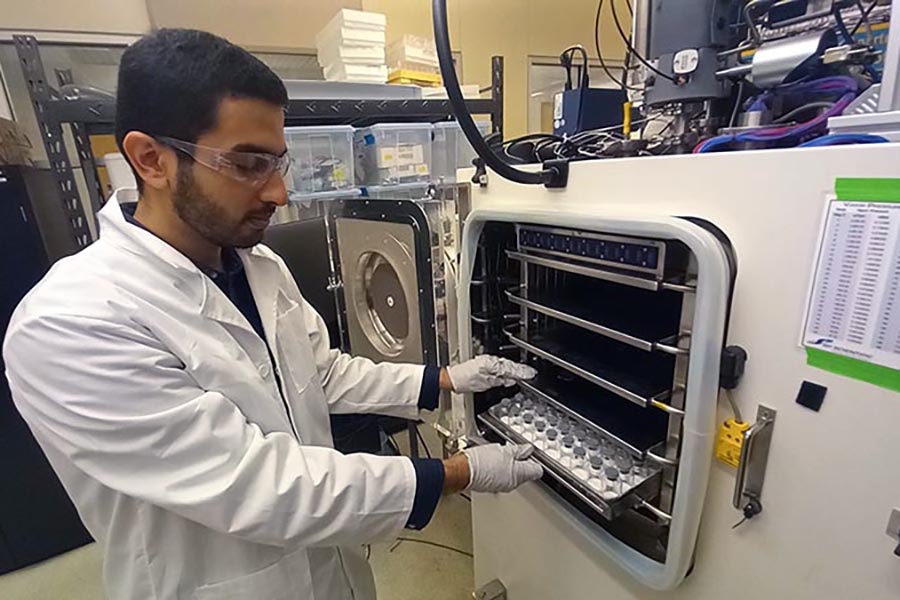Purdue’s microwave technology could lead to more stable vaccine supply chain

Faster, more cost-effective process touted as ‘significant advancement’ for the worldwide supply chain
The COVID-19 pandemic put a spotlight on the vaccine supply chain and public health impact of vaccine stability. But Purdue University researchers have been working on the problem for years — using rocket science to advance a freeze-drying technology that lengthens product shelf life. And that technology could soon be available in the marketplace.
A Purdue-led team has been awarded nearly $1 million to pursue a technology of using microwaves to make the freeze-drying process twice as fast and more cost-effective. Like astronaut ice cream, many vaccines are made stable for transport and storage through freeze-drying, also known as lyophilization.
“We want to push the technology further so that lifesaving treatments like COVID vaccines can easily reach every corner of the world,” said project leader Alina Alexeenko, senior associate dean for undergraduate education and academic programs at Purdue University in Indianapolis and professor of aeronautics and astronautics and chemical engineering in Purdue’s College of Engineering. “The conditions required for lyophilization are like those in outer space — it is a cold vacuum. We approach innovations in lyophilization equipment design and process the same way teams approach new spacecraft design. This time we’ve found a way to apply microwaves to get past some of the challenges the environment presents.”
Alexeenko is co-founder and co-director of LyoHUB, a university-industry center that brings together academic and industry researchers, representatives from government agencies, equipment manufacturers, and end-product users to improve freeze-drying technology to make food, pharmaceuticals and biotech products safer and more affordable.
The standard freeze-drying process is very expensive, but Alexeenko said the new technology could be much more cost-efficient, with the potential for an immediate impact on lives and the worldwide supply chain.
Merck and IMA Life North America Inc. have partnered with Purdue on the microwave project, which is funded by The National Institute for Innovation in Manufacturing Biopharmaceuticals (NIIMBL).
Merck is providing vaccine samples and leading development of benchmarks to compare the conventional and microwave lyophilization. IMA Life will lead integration of the new technology with the entire manufacturing process for sterile pharmaceuticals and vaccines.
“This microwave technology promises to not only provide uniformity to the drug product but also accelerate the freeze-drying process,” said Ernesto Renzi, president of sales and marketing at IMA Life North America.
In addition to Alexeenko, the research team at Purdue includes Eric Munson, the Dane O. Kildsig Chair and head of the Department of Industrial and Physical Pharmacy; Vivek Narsimhan, the Michael Ott Assistant Professor of Chemical Engineering in the Davidson School of Chemical Engineering; Dimitrios Peroulis, the Reilly Professor of Electrical and Computer Engineering and senior vice president for Purdue University Online; and Qi (Tony) Zhou, associate professor of industrial and physical pharmacy.
“This is a significant advancement of a technology that can have an immediate impact on lives and the U.S. supply chain,” said Karen Plaut, Purdue University’s executive vice president of research. “Centers like LyoHUB are a great example of how we draw upon Purdue’s deep research strengths and state-of-the-art facilities, such as Birck Nanotechnology Center, and leverage the expertise of industry and government to improve our world.”
Alexeenko’s startup, LyoWave, is working with Purdue Innovates Office of Technology Commercialization to bring this technology to the marketplace.
“This is yet another example of a Purdue innovation that can make an impact on the world,” said Purdue Innovates senior vice president Brooke Beier. “Purdue Innovates is focused on results: transforming research into intellectual property that can be licensed to startups and industries and, finally, products that can save lives.”
Source: Purdue’s microwave technology could lead to more stable vaccine supply chain
